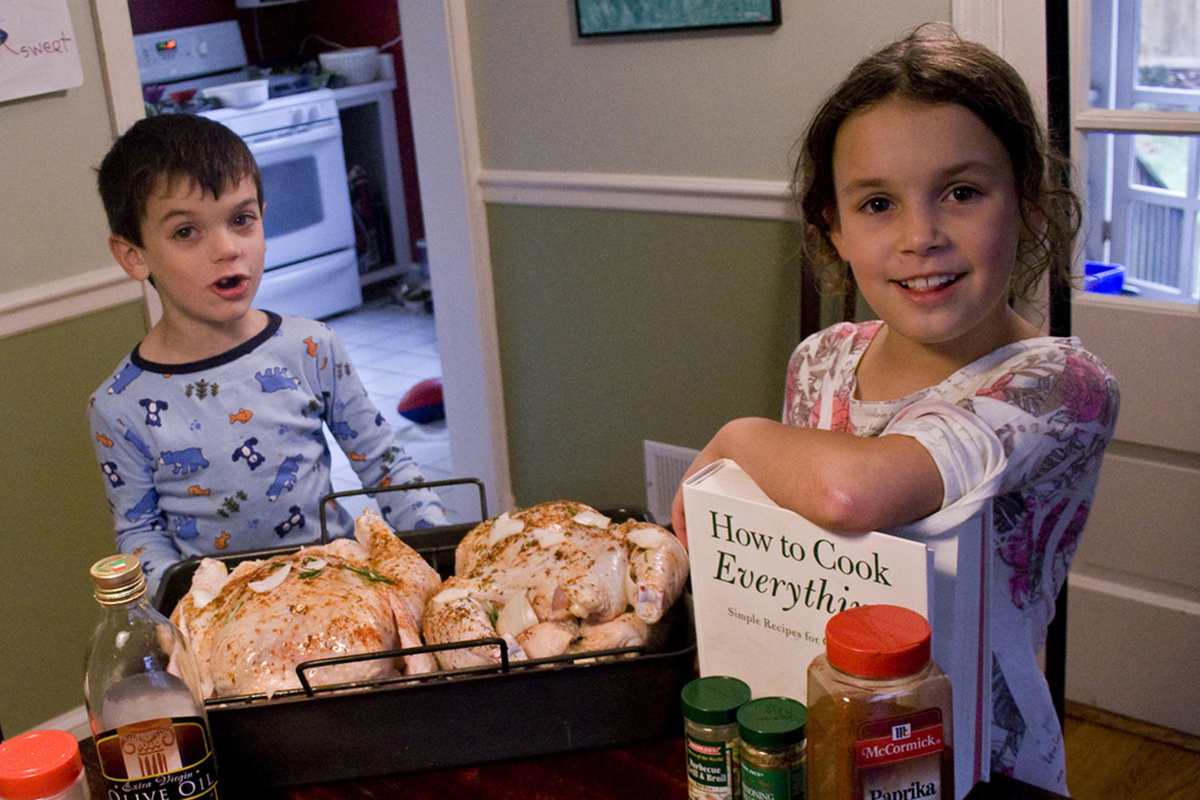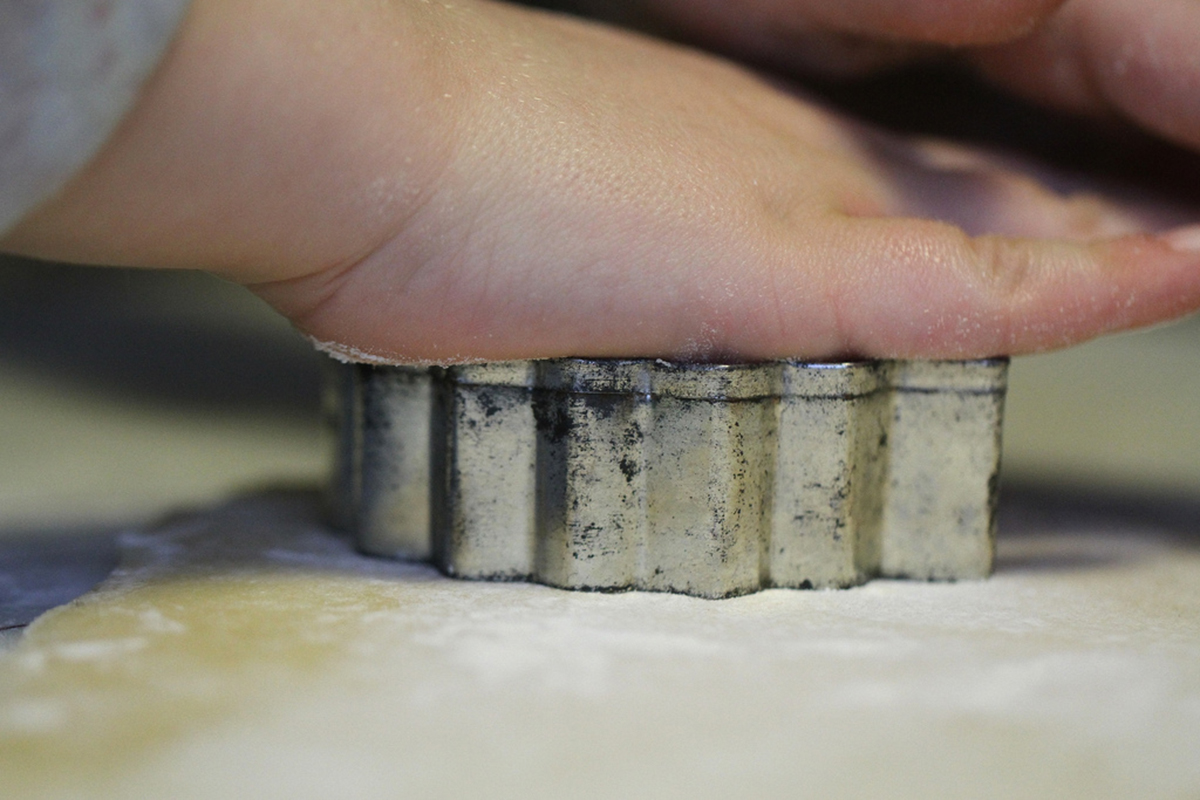The first time I saw my friend's four-year-old son make pancakes all by himself was fascinating. My friend and I were chatting in the garden when the little chap brought out jam pancakes for us to try. I assumed his dad had been helping him, but no — he had made pancakes from scratch, all alone.

Surprised, I followed him back to the kitchen to take a look. He knew the recipe for pancake batter, had collected the right ingredients and mixed them, and could operate the stove responsibly all by himself. He stood on a little stool to flip his pancakes. His dad was very nearby, watching what he was doing, but did not help his son: there was no need.
This event turned my perceptions of what kids are and aren't capable of upside down. My kids, who were a few years older than him, were not capable of anything of the kind. Seeing what this little boy could do made me change my approach. We live in a society where risk-avoidance is many parents' prime goal, but could we be trimming kids' budding independence like we would trim a Bonzai tree?
Why Should You Be Cooking With Your Children?
Allowing your small kids access to your kitchen — with its many hazards — takes bravery. It's scary, and perhaps a bit controversial. It's also worth it. Here's why.
It's Fun!
Everyone needs to eat, and home-cooked meals come with many benefits. Are you a busy, working parent who simply doesn't have much time to spare? You may think your cooking takes away from valuable time with your children, unless of course you can involve them in the process. Cooking together is bona fide quality time. Kids love seeing their own creations, love getting their hands dirty, and love the confidence you have in them.
Cooking Promotes Motor Skills
Cutting vegetables (with a moderately sharp knife, like an ordinary table knife), mixing ingredients, kneading dough, decorating cookies... all of these activities address motor skills Kindergarten teachers encourage through crafts like cutting and gluing, using playdough, and coloring within the lines. Cooking promotes motor skills, and that alone is a powerful argument in favor of letting your kids loose in the kitchen.
Kitchen Math
Is your kid just starting to learn arithmetic, or perhaps already well into division, multiplication, and fractions? Cooking together can help develop math skills, too. From measuring to fractions (cutting pizza or pie, for instance), to multiplication (doubling, tripling or quadrupling recipes) and division (the same in reverse), working in the kitchen shows children that math really does come in handy in real life. Cooking also teaches time-keeping skills. In addition (excuse the pun), kids who are struggling with math often benefit from visually seeing how concepts can play out. Cooking can facilitate that, with just a little bit of creativity.
See Also: Finicky Kids: Tempting The Fussy Eater
Learn About Nutrition Together
Finally, cooking together provides a fantastic opportunity to teach your kids about healthy nutrition. You can talk about the food pyramid and different food groups, showing your children that a balanced diet is hugely important. That's good stuff, but by being involved in the kitchen, you allow your kids to get more than theory. You're not just modeling what a healthy diet looks like by putting good food in front of them, but also getting them in on the act. Kids who know how to cook, and how to cook healthy meals, are much more likely to adopt life-long healthy eating habits than those who have just been passive consumers of food.
Cooking Ideas Kids Will Love
Where do you start, if your children are kitchen virgins? Cookies and cakes may not be healthiest, but they are fun to make and can give you a wonderful treat once in a while. Just yesterday, I invited a bunch of my kids' friends over to our house to make cookies together. We went the whole nine yards, with spices, decorations, frosting, and everything. Every kid was part of the process of figuring out the recipe, finding ingredients, measuring them out, and mixing the batter. Then, each child got to decorate their own cookies however they wanted.

It was a huge hit. Some of these kids had never helped in the kitchen before. Today, one of them phoned me to tell me just how great a time she had. Cookies are easy for beginning cooks, and a lot of fun.
Meal Planning
Are you a meal-planning family? Getting your kids involved in the process is a great way to prepare for some serious cooking. Sit down together once a week, and browse the web for things you'd like to eat. Brainstorm ideas first, and then Google. It's great if each person has the opportunity to choose at least one meal — which they can then help prepare to the fullest of their abilities. If your kids take packed lunches to school, this is an area where you can give them a lot of autonomy. Do talk about budgetary constraints, of course, and teach them to stay away from extraordinarily expensive ingredients.
Gathering Ingredients
Once you have your meal plan for the week ready, you can print or write down the recipes you'll be using. Asking your kids to gather the ingredients for you while you clean the kitchen or are engaged in some other task promotes organizational skills and gets them involved in the cooking process. Once you do this for a while, it can save you an awful lot of time.
Cutting And Peeling
Kids as young as four or five can safely use a Y peeler. These peelers have safety blades perpendicular to the handle, and are unlikely to cause injury. Very young kids can cut soft fruits like bananas and strawberries with plastic knives. Older kids can use table knives, while experienced cutters might be ready for real kitchen knives. Teach them about knife safety first, though: they should cut away from their bodies where relevant and not place their fingers in places where they may end up chopping them. Graters may seem benign, but watch out: grating your own skin is easy.
Operating The Stove
Toddlers are usually taught that stoves are dangerous and they should keep their distance. My kids were afraid to get near our stove for a long time, but are now confident about using it. We have an electrical stove, however, and that is a bit less hazardous than gas stoves, which have an open flame. The main thing here is to supervise your kids all the time, until you are absolutely confident they won't cause a fire. That is more likely to be around age 12 than age five. However, with adequate supervision, many kids will be able to learn to use a stove and enjoy it. You will probably want to drain boiling water for your kids, because handling heavy saucepans with boiling water is dangerous. Likewise, you'll want to remove oven dishes from the oven.
Meals Kids Can Make Fairly Independently
Here are some meal ideas my kids have executed with supervision but little help:
- Pancakes, cookies, and cakes
- Pizza: making the dough, choosing the toppings, and decorating the pizza.
- Stir-fries: choosing and cutting vegetables, selecting either rice or noodles, stirring the stir-fry, and adding sauces.
- Bread: choosing a recipe, preparing the yeast, kneading the dough, shaping the bread (braids, other shapes), and turning on the oven to the right temperature.
- Salads: Googling recipes, buying the ingredients, cutting, and making a dressing.
- Omelettes with vegetables.
- Juices, using a juicer.
See Also: Music Training Promotes Brain Development In Kids
A Note About Safety
Only you know when your kids are ready to do serious kitchen work. There is no magic age at which a child is ready — skills like paying attention to detail and responsible behavior are more important than how old a child is. Accidents can always happen, however, and having a good first-aid kit in your kitchen is a good idea for anyone.
- Photo courtesy of Woodleywonderworks via Flickr: www.flickr.com/photos/wwworks/2985216277
- Photo courtesy of photochem_PA via Flickr: www.flickr.com/photos/58431807@N06/11539941255


Your thoughts on this